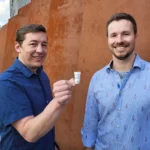The Spark Fund supports commercially valuable inventions from university researchers in earlier stages of development – from any field. The goal of the award is to advance a technology or suite of technologies from academia toward commercialization.
“Being a reviewer for the applications and a judge for the finalists’ presentations I was very impressed by the high-quality research projects coming through this program,” says Shahila Christie, Ph.D., Spark Fund Advisor and Vice President of Growth Strategy & Operations at Portal Innovations. “The CRI Spark Fund Team has done an excellent job curating the program and setting up Northeastern researchers for success at the proof-of-concept stage.”
Spark Fund grants may be used to advance the commercial prospects of inventions in many different ways, including but not limited to:
- Building a commercially ready prototype
- Animal testing to generate in vivo data
- Optimizing processes for yield, speed, cost
- Repurposing tech to meet industry needs
Each award cycle includes five or more award recipients who must present their research and commercialization strategy to a panel of industry advisors and judges. Each award recipient receives a grant of up to $50,000 – that is over $600,000 annually! The Fall 2023 Spark Fund awardees represent a vast variety of innovative and exciting fields, from manufacturing to cell biology to green technology. The six awardees were carefully evaluated and chosen out of a pool of strong applicants by judges who are leaders in innovation in industry. Their research accomplishments and society-driven ideals greatly impressed the CRI team.
AWARDEES:
Associate Professor Dori Woods
 The Woods Laboratory is studying the role of mitochondria in normal and disease states, with a focus on how mitochondria are specifically tailored to a cell’s functional or dysfunctional requirements. With the help of the Spark Fund, the team aims to fully harness the therapeutic potential of mitochondrial subtypes and deeply explore the causal link of mitochondrial function in the maintenance of critical cell fate processes. Most recently, the team developed and validated a computational pipeline (patent pending) to thoroughly assess cellular component (e.g., mitochondria) constructs in great detail. This research led to the creation of a spin-out company, Calafate Biologics.
The Woods Laboratory is studying the role of mitochondria in normal and disease states, with a focus on how mitochondria are specifically tailored to a cell’s functional or dysfunctional requirements. With the help of the Spark Fund, the team aims to fully harness the therapeutic potential of mitochondrial subtypes and deeply explore the causal link of mitochondrial function in the maintenance of critical cell fate processes. Most recently, the team developed and validated a computational pipeline (patent pending) to thoroughly assess cellular component (e.g., mitochondria) constructs in great detail. This research led to the creation of a spin-out company, Calafate Biologics.
With its disruptive Compartmentalized Cell Biology approach, Calafate Biologics is uncovering previously hidden target genes from widely available multi-omics datasets in a variety of biological processes ranging from cancer chemoresistance to neurodegeneration. By anchoring data exploration to a biologically relevant component (organelle of interest), their contemporary integrated pipeline outputs immediately clear and actionable leads, ushering in a new era of next-generation diagnostic and therapeutic products.
Randall Erb, Ph.D.
 Randy Erb, Ph.D. has been investigating the interplay between material microstructure and properties for over a decade. His key expertise lies in leveraging colloidal physics within advanced manufacturing systems to drive the assembly of mesoscale material structures. He has a strong track record of successfully commercializing advanced manufacturing technologies and was previously awarded a Spring 2022 Spark Fund award.
Randy Erb, Ph.D. has been investigating the interplay between material microstructure and properties for over a decade. His key expertise lies in leveraging colloidal physics within advanced manufacturing systems to drive the assembly of mesoscale material structures. He has a strong track record of successfully commercializing advanced manufacturing technologies and was previously awarded a Spring 2022 Spark Fund award.
In the DAPS Lab, he is developing advanced manufacturing platforms that can process phononic crystals into intricate parts at high rates of production. The DAPS Lab leverages colloidal physics to direct the assembly of material microstructures enabling new and enhanced materials properties. Their developments with the Spark Fund award will be used to create the next generation of thermal management solutions.
Professor Eno Ebong
 The Ebong Mechanobiology Laboratory studies how blood flow affects the endothelial cells that line blood vessels, focusing on the glycocalyx. The glycocalyx, a gel-like structure of sugars and proteins, converts mechanical forces into biological responses to protect against disease. Shedding of the glycocalyx promotes pathological remodeling, leading to atherosclerosis — the underlying cause of the majority of heart attacks, strokes, aneurysms, peripheral vascular disorders, and other cardiovascular conditions that affect millions of adults worldwide — and tumor formation. The lab replicates healthy and disruptive conditions using in vitro systems and live animal studies to understand the flow-glycocalyx-endothelial cell relationship. The goal of this research, supported by the Spark Fund, is to develop a new therapeutic approach that will be capable of intervening in early disease stages and reversing disease progression.
The Ebong Mechanobiology Laboratory studies how blood flow affects the endothelial cells that line blood vessels, focusing on the glycocalyx. The glycocalyx, a gel-like structure of sugars and proteins, converts mechanical forces into biological responses to protect against disease. Shedding of the glycocalyx promotes pathological remodeling, leading to atherosclerosis — the underlying cause of the majority of heart attacks, strokes, aneurysms, peripheral vascular disorders, and other cardiovascular conditions that affect millions of adults worldwide — and tumor formation. The lab replicates healthy and disruptive conditions using in vitro systems and live animal studies to understand the flow-glycocalyx-endothelial cell relationship. The goal of this research, supported by the Spark Fund, is to develop a new therapeutic approach that will be capable of intervening in early disease stages and reversing disease progression.
Dr. Eno Ebong, who leads the multi-disciplinary project team is an expert on cardiovascular cell and molecular mechanobiology, endothelium glycocalyx, and vascular remodeling.
Assistant Professor Leigh Plant, Ph.D.
 Assistant Professor Leigh Plant of The Plant Lab studies how cell signaling pathways control the physiology and pharmacology of the protein machinery that controls electrical signals in the heart and brain. By combining state-of-the-art techniques, including electrophysiology, spectroscopy, single-molecule imaging, super-resolution microscopy and computation, the Plant lab investigates the physiology and pharmacology of ion channels and G protein-coupled receptors in cardiac cells, neurons and the kidney. Specifically, the Plant Lab is focused on improving the therapeutic efficacy of treatments for Muscular dystrophies (MD) — rare, genetic disorders of skeletal muscle that have a profound detrimental effect on the quality of a patient’s life and can cause premature death.
Assistant Professor Leigh Plant of The Plant Lab studies how cell signaling pathways control the physiology and pharmacology of the protein machinery that controls electrical signals in the heart and brain. By combining state-of-the-art techniques, including electrophysiology, spectroscopy, single-molecule imaging, super-resolution microscopy and computation, the Plant lab investigates the physiology and pharmacology of ion channels and G protein-coupled receptors in cardiac cells, neurons and the kidney. Specifically, the Plant Lab is focused on improving the therapeutic efficacy of treatments for Muscular dystrophies (MD) — rare, genetic disorders of skeletal muscle that have a profound detrimental effect on the quality of a patient’s life and can cause premature death.
The Plant Lab will use the Spark Award funds to identify and further advance promising compounds towards the clinic by completing key IND-enabling studies. This multi-step process includes in vitro screening of efficacy, safety and druggability, and pilot animal studies to identify the best compound for clinical development for the treatment of MD.
Professor Rebecca Carrier
 Professor Rebecca Carrier and her team at The Advanced Drug Delivery Research Lab conduct research in regenerative medicine, with a focus on enabling effective oral delivery of therapeutics. They have received the Spark Fund grant for their work developing a mechanism-based algorithm to streamline oral drug formulation. Their algorithm can reduce the need for trial-and-error formulation development with lipids by providing rational guidance on the most optimal quantities and types of lipids to achieve desired drug absorption kinetics. Their algorithm employs a systems-based approach, integrating expressions capturing key transport and kinetic processes to predict overall impact of lipids on bioavailability. The model can inform rational design of lipid-based formulations of oral drugs that suffer from poor bioavailability.
Professor Rebecca Carrier and her team at The Advanced Drug Delivery Research Lab conduct research in regenerative medicine, with a focus on enabling effective oral delivery of therapeutics. They have received the Spark Fund grant for their work developing a mechanism-based algorithm to streamline oral drug formulation. Their algorithm can reduce the need for trial-and-error formulation development with lipids by providing rational guidance on the most optimal quantities and types of lipids to achieve desired drug absorption kinetics. Their algorithm employs a systems-based approach, integrating expressions capturing key transport and kinetic processes to predict overall impact of lipids on bioavailability. The model can inform rational design of lipid-based formulations of oral drugs that suffer from poor bioavailability.
Associate Professor Yi Zheng
 Professor Zheng leads the Nano Energy Laboratory, which emphasizes the theoretical, analytical, and experimental investigations on energy transport phenomena and opto-thermal sensing. The lab aims to enhance physical, particularly thermal and optical, properties of functional materials and explore their applications in energy conversion, storage, and harvesting systems, thermophotovoltaics, sensing, thermal diodes and transistors, and passive cooling technique. Zheng was previously awarded a Spring 2022 Spark Fund award for his work developing a passively cooling roofing material to reduce energy consumption in hotter climates. Now, the team has taken technical insights and feedback from that project and shifted to develop a more manufacturable and commercially viable passive cooling bio-pigment paint.
Professor Zheng leads the Nano Energy Laboratory, which emphasizes the theoretical, analytical, and experimental investigations on energy transport phenomena and opto-thermal sensing. The lab aims to enhance physical, particularly thermal and optical, properties of functional materials and explore their applications in energy conversion, storage, and harvesting systems, thermophotovoltaics, sensing, thermal diodes and transistors, and passive cooling technique. Zheng was previously awarded a Spring 2022 Spark Fund award for his work developing a passively cooling roofing material to reduce energy consumption in hotter climates. Now, the team has taken technical insights and feedback from that project and shifted to develop a more manufacturable and commercially viable passive cooling bio-pigment paint.
Learn More
Check out our website if you’d like to learn more about the six Fall 2023 Spark Fund awardees research and innovations, as well as the eligibility requirements and the terms of the funding. The Spark Fund awards are presented twice per year, with a Fall and a Spring cohort annually. Applications are currently closed, but the next application cycle for the Spring awards will be announced in the coming months.
